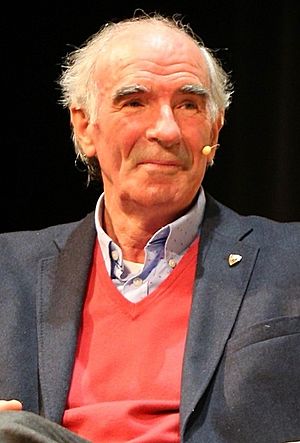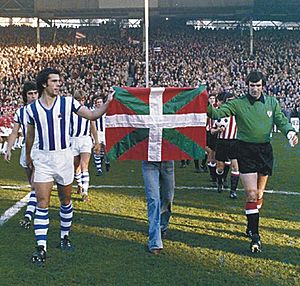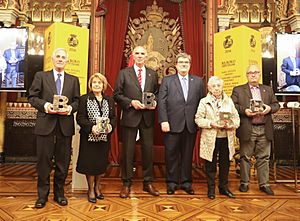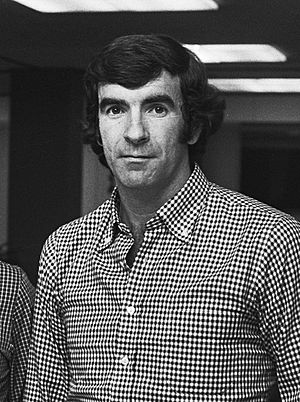José Ángel Iribar facts for kids

Iribar in 2019
|
|||||||||||||
| Personal information | |||||||||||||
|---|---|---|---|---|---|---|---|---|---|---|---|---|---|
| Full name | José Ángel Iribar Kortajarena | ||||||||||||
| Date of birth | 1 March 1943 | ||||||||||||
| Place of birth | Zarautz, Spain | ||||||||||||
| Height | 1.82 m (6 ft 0 in) | ||||||||||||
| Position(s) | Goalkeeper | ||||||||||||
| Youth career | |||||||||||||
| Salleco | |||||||||||||
| Zarautz | |||||||||||||
| Senior career* | |||||||||||||
| Years | Team | Apps | (Gls) | ||||||||||
| 1961–1962 | Basconia | 24 | (0) | ||||||||||
| 1962–1980 | Athletic Bilbao | 466 | (0) | ||||||||||
| Total | 490 | (0) | |||||||||||
| International career | |||||||||||||
| 1964–1976 | Spain | 49 | (0) | ||||||||||
| 1979 | Basque Country | 1 | (0) | ||||||||||
| Managerial career | |||||||||||||
| 1983–1986 | Bilbao Athletic | ||||||||||||
| 1986–1987 | Athletic Bilbao | ||||||||||||
| 1987 | Bilbao Athletic | ||||||||||||
| 1988 | Basque Country | ||||||||||||
| 1993–2010 | Basque Country | ||||||||||||
|
Medal record
|
|||||||||||||
| *Club domestic league appearances and goals | |||||||||||||
José Ángel Iribar Kortajarena (born on March 1, 1943) is a famous Spanish former football goalkeeper and manager. People often called him El Chopo, which means "the Poplar tree," because he was tall and strong.
He played almost his entire career for Athletic Bilbao, a well-known Spanish football club. He played in over 600 official games for them during 18 seasons in La Liga, Spain's top football league. During his time, he helped the team win two Copa del Generalísimo trophies.
Iribar also played for the Spanish national team. He was part of the team that won the 1964 European Nations' Cup and also played in the 1966 FIFA World Cup.
Contents
Playing for Athletic Bilbao
José Ángel Iribar was born in Zarautz, a town in Spain. He started his professional football journey at CD Basconia in 1961. His amazing performance there led to him joining Athletic Bilbao in 1962.
At Athletic Bilbao, Iribar quickly became the main goalkeeper. He helped his team win two Spanish Cups. He also played in the final of the 1976–77 UEFA Cup, though they lost that game to Juventus FC. In the 1969–70 season, he won the Ricardo Zamora Trophy. This award is given to the goalkeeper who lets in the fewest goals in La Liga. He only conceded 20 goals in 30 games that season.
Iribar played his last game in 1980 when he was 37 years old. He played a total of 614 games for Athletic Bilbao, which was a club record for many years. He also held the record for the most games played in European competitions for the club until 2016.
After he stopped playing, Iribar became a coach. He coached Athletic Bilbao's reserve team, Bilbao Athletic, in the 1983–84 season. He also coached the main Athletic Bilbao team for one season in 1986–87. For over 20 years, starting in 1988, he coached the Basque Country representative team.
In December 2023, a statue of Iribar was placed outside the San Mamés Stadium, which is Athletic Bilbao's home ground.
Playing for Spain
Iribar played his first game for the Spanish national team on March 11, 1964. Spain won that game against the Republic of Ireland. He was the starting goalkeeper when Spain won the 1964 European Nations' Cup on their home soil.
He also played for Spain in the 1966 FIFA World Cup, playing in all three group-stage matches. He continued to play for Spain for another ten years. His 49th and final game for Spain was on April 24, 1976, in a match against West Germany.
How he played
Many people consider José Ángel Iribar one of the best goalkeepers ever. Iker Casillas, who won the 2010 FIFA World Cup as a goalkeeper for Spain, said Iribar was "one of the greatest keepers Spain has ever produced." Casillas also mentioned that Iribar was a "big presence in goal" and could "intimidate opponents." He added that Iribar combined his physical strength with excellent positioning.
In Italy, Iribar was sometimes called "Zoff's twin." This was because he was similar to the famous Italian goalkeeper Dino Zoff in his goalkeeping skills, leadership, and even how he looked.
Political views

On December 5, 1976, before a game against Real Sociedad, Iribar and the opposing team's captain, Inaxio Kortabarria, did something very important. They carried the Ikurriña, which is the Basque flag, onto the field and placed it in the center. This was the first time the flag was shown publicly since the death of Francisco Franco, a former Spanish leader, and the flag was still illegal at that time.
After his football career, Iribar became involved in local politics in the Basque region. He was one of the people who helped start a political group called Herri Batasuna, which supported more independence for the Basque Country.
Career statistics
| National team | Year | Apps | Goals |
|---|---|---|---|
| Spain | 1964 | 5 | 0 |
| 1965 | 2 | 0 | |
| 1966 | 6 | 0 | |
| 1967 | 5 | 0 | |
| 1968 | 5 | 0 | |
| 1969 | 1 | 0 | |
| 1970 | 5 | 0 | |
| 1971 | 3 | 0 | |
| 1972 | 6 | 0 | |
| 1973 | 3 | 0 | |
| 1974 | 5 | 0 | |
| 1975 | 2 | 0 | |
| 1976 | 1 | 0 | |
| Total | 49 | 0 | |
Awards and Honours

Athletic Bilbao
- Copa del Generalísimo: 1969, 1972–73
- UEFA Cup runner-up: 1976–77
Spain
Individual Awards
- Ricardo Zamora Trophy: 1969–70 (Award for the best goalkeeper in La Liga)
- La Liga Team of The Year: 1975–76
See also
 In Spanish: José Ángel Iribar para niños
In Spanish: José Ángel Iribar para niños
- List of Athletic Bilbao players (Players with over 200 appearances for Athletic Bilbao)
- List of La Liga players (Players with over 400 appearances in La Liga)


